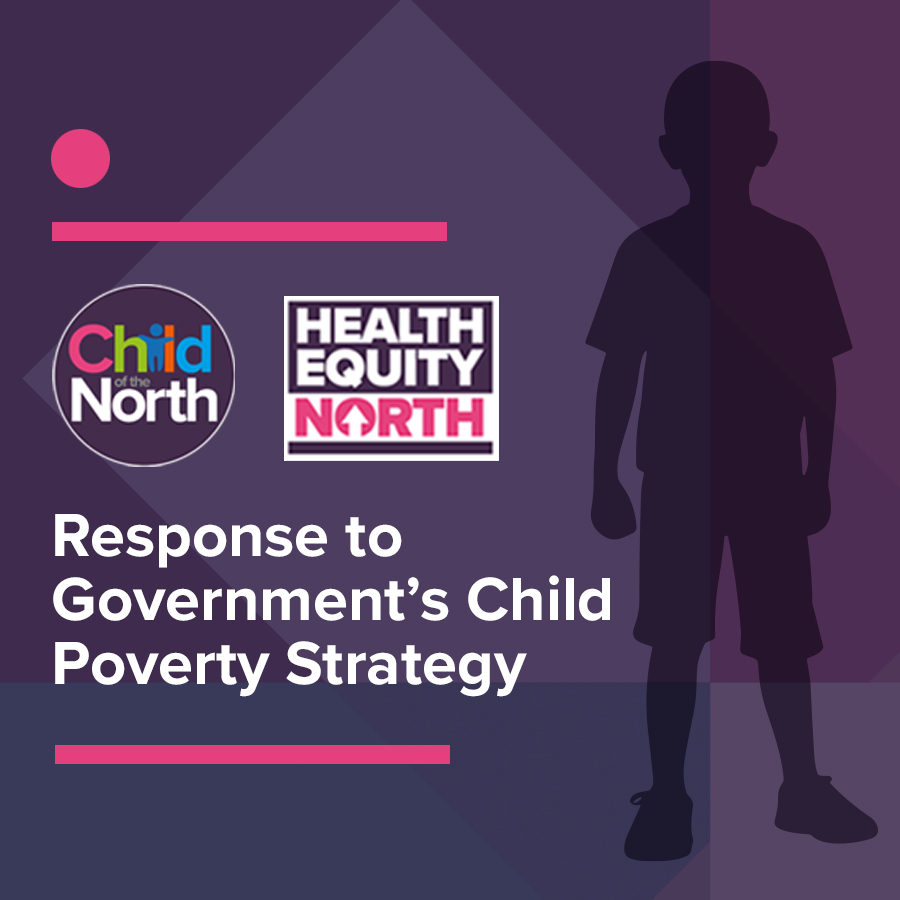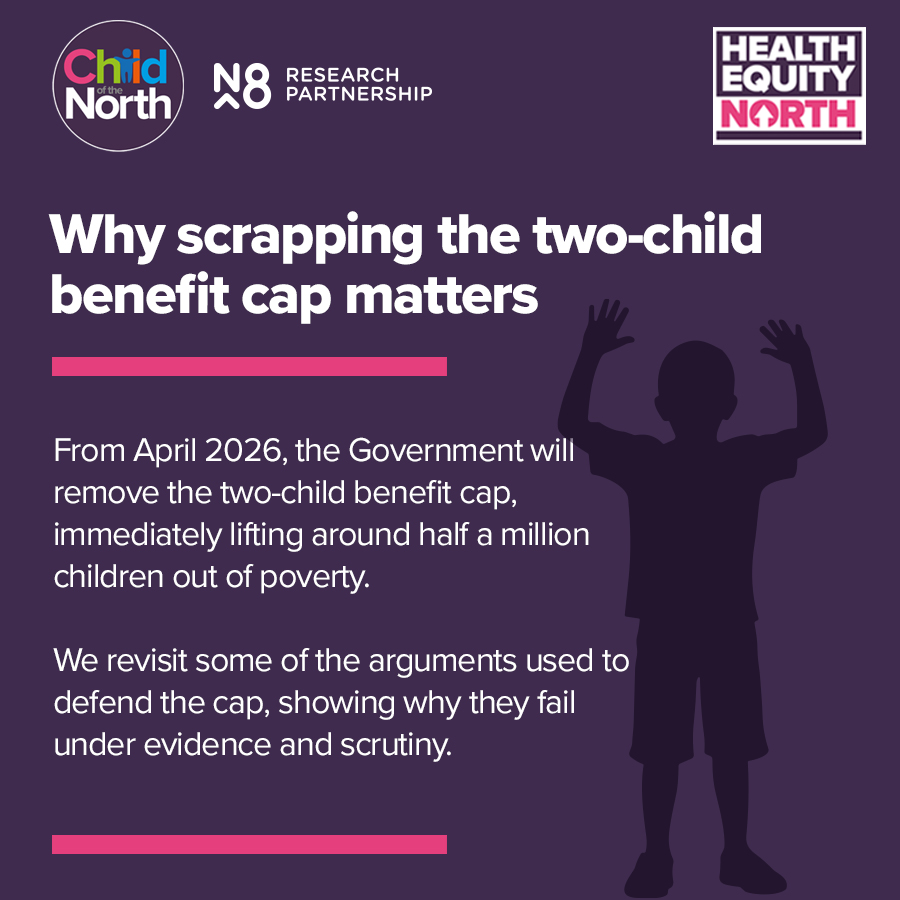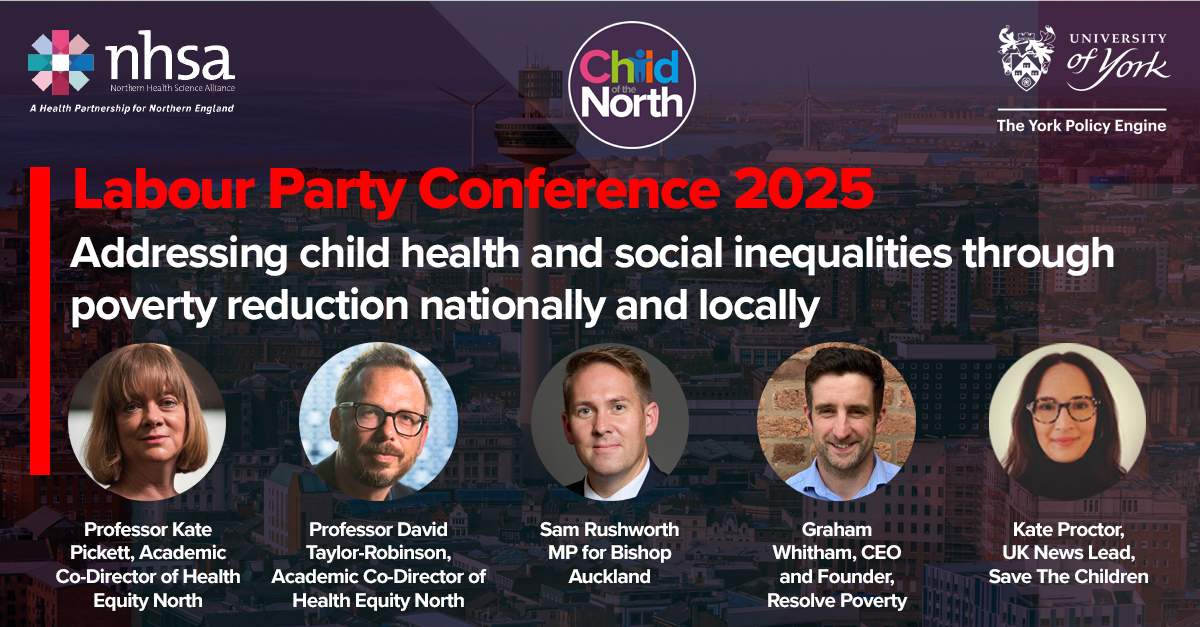BLOG – Spending Review 2025: what this means for children in the North

By Alexis Darby, Head of Public Affairs, Health Equity North
The 2025 Spending Review offers a mix of progress and missed opportunities for children and families in the North of England. While there are positive steps in recognising the wider determinants of child health, such as funding for parks, youth clubs, and early years education, the overall package falls short of the bold, targeted investment needed to address entrenched inequalities in Northern communities.
As Secretariat for the Child of the North All-Party Parliamentary Group (APPG), I welcome measures like the school uniform and bus fare cap, and the recognition of the importance of early intervention and support services. However, critical gaps remain, most notably the lack of direct action on child poverty, with no commitment to scrapping the two-child benefit limit, and the absence of plans to expand Family Hubs in the areas that need them most.
This Spending Review acknowledges the challenges facing children and families, but for those in the North, where child poverty, health inequalities, and educational funding gaps remain stark, what is needed is not just policy intent: but urgent and targeted delivery.
Communities
Announcements regarding communities are progressive and again show an understanding of the wider determinants of ill health.
Funding for parks and youth clubs in Blackpool, Southport, and Newcastle underline the importance of community and offering people a ‘third place’ to enhance social interaction and be part of the community.
Practical policies such as capping the cost of school uniforms and extending the £3 bus fare cap, are welcome. These measures offer real help to families facing everyday cost pressures.
However, the overall package lacks the place-based targeting we had hoped for. The North continues to experience entrenched levels of inequality, and the announcements don’t go far enough to ensure resources are directed where they’re most urgently needed.
We would have liked to see a more explicit focus on northern communities, alongside a commitment to expand Family Hubs. Vital local infrastructure that supports children and families from birth through adolescence and has been proven to have a positive effect on mental health and exam results. The hubs offer joined-up services and early intervention, and their absence from today’s announcements is a missed opportunity.
Early Years and Schools
The new funding for children and education includes:
- £370 million for school-based nurseries
- £550 million in transformation funding to prevent children entering care unnecessarily
- £132.5 million from dormant assets for arts and cultural access for disadvantaged children
- An increase of £4.5 billion per year to the schools budget
These commitments reflect a growing recognition of the importance of early years and education. However, as our report ‘Addressing Education and Health Inequity’ showed, educational funding in the North of England has fallen behind the rest of the UK over the past decade. Worsened by the cost-of-living crisis and the Covid-19 pandemic, this has led to lower educational attainment and higher school absences due to health issues.
Our research shows that schools in London received an average of £6,610 per pupil compared to £6,225, £5,956, and £5,938 in the North East, North West, and Yorkshire and the Humber, respectively.
We found that children in the most affluent schools in the country had bigger real terms increases in funding than those in the most deprived ones, despite the increased burden placed on these schools due to wider societal issues that impact the families they serve.
To tackle this, we would have liked the Chancellor to have announced plans to:
- Allocate additional funding over 2025-30 to secondary and post-16 providers to address the lag before the new (fairer) National Funding Formula (NFF) takes effect. Implement the National Audit Office’s recommendation to “evaluate the impact” of the NFF.
- Address historical structural inequalities by immediately developing options to adjust the NFF to include the “health burden” borne by schools from 2025.
Children in the most affluent schools in the country had bigger real terms increases in funding than those in the most deprived ones, despite the increased burden placed on these schools due to wider societal issues that impact the families they serve.
Child Poverty
Currently, 4.6 million children are growing up in poverty and as our ‘Child Poverty and the Cost of Living Crisis’ report showed in Yorkshire and the Humber and the North East, child poverty is now the highest it has been since the year 2000. These figures should be at the forefront of any government strategy. But the Spending Review does not include plans to end the two-child benefit cap, a policy that the APPG has been calling to end, as, if reversed, would lift 350,000 children immediately out of poverty.
We very much welcome the £550 million in transformation funding to prevent children entering care unnecessarily. But would have like to have seen this targeted for places with the greatest need. Our ‘Children in Care’ report found that the North records extreme outliers for high care rates. In Blackpool one in every 52 children is in care. In North East Lincolnshire, the figure is one in 57. In Hartlepool, one in 63. While this funding is welcome, the government must tackle child poverty as a social determinant must acknowledge the causal impact of poverty on children and families’ wellbeing and subsequent care entry. As said previously, scrapping the two-child limit would go some way to doing this.
Regeneration and Housing
Announcements such as:
- The Growth Mission Fund to support regeneration in towns like Southport
- The £39 billion investment in social housing over the next decade, with Blackpool, Preston, and Sheffield set to benefit
- Updates to the Green Book guidance to ensure no place is disadvantaged when making its case for funding
are all steps in the right direction. Better housing, employment, and neighbourhood infrastructure are crucial for children’s health and development. These investments must now be delivered swiftly and equitably, with accountability for how resources are distributed across regions.
While the Spending Review lays some strong foundations, we urge the government to go further:
- End the two-child benefit cap – which one in 9 children are affected by
- Expand Family Hubs, particularly in the North, to strengthen local support for families
- Target funding where need is greatest, ensuring communities in the North are not left behind
- Embed children’s wellbeing in all spending decisions, not just those related to education or health
We are encouraged by the recognition of the broader drivers of health and the investments announced. But for children in the North, who continue to experience some of the worst outcomes in the country, these commitments must go hand-in-hand with urgent action on poverty and inequality.
The Spending Review provides a platform, but what matters now is delivery, and whether these funds reach the children and families who need them most.






